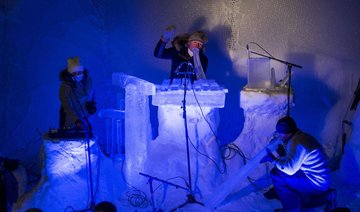DUBAI: Almost three years on from introducing the world to a new sound with their debut release, “Shamstep,” 47Soul are back with what they are calling their debut studio album, “Balfron Promise,” released earlier this month.
The London-based four piece, all of whom are of Palestinian origin, have generated huge buzz in that time, receiving critical acclaim for their songs, but also for their high-energy, wildly-celebratory live shows, which have connected with audiences in the West just as strongly as with youth in the Middle East.
“Shamstep” is the name the band give their anthemic blend of electronic hip-hop, hints of reggae, and the traditional dabke music of Bilad Al-Sham, topped off with raucous unison vocals in both English and Arabic. The party vibe balances the group’s socially conscious lyrics, which — while still often optimistic — focus on the struggle for freedom and equality of all kinds, and the feeling of rootlessness shared by so many in the Palestinian diaspora, the Middle East and beyond.
The idea of 47Soul becoming a full-time venture for its members took some time to arise. When the four musicians — MC/vocalist and darouka player Tareq Abu Kwaik (aka El Far3i), percussionist and MC/vocalist Walaa Sbeit, guitarist and vocalist Hamza Arnaout (aka El Jehaz), and keyboardist and vocalist Ramzy Suleiman (aka Z the People) — first got together, it was for a short-term project at London’s biennial Shubbak Festival. All four were already established artists in their own right, whether solo or with bands (Arnaout in Jordanian indie outfit Autostrad, Sbeit in Ministry of Dub-Key).
“The idea of 47Soul wasn’t that this could actually become a band,” El Far3i told Arab News. “It was more like a ‘seasonal collective.’ It wasn’t serious. But after we played those shows in the UK and we felt the impact of what we’d done, the idea of this becoming a full-time band started to come out.”
El Far3i said the hugely positive reception of the band’s work was a surprise but “not completely unanticipated.”
“We had that feeling when you’re writing songs with friends and you go, ‘man! If we did this… I bet it’ll go hard and people will feel it.’ That feeling of what you think the collective musical mindset can receive at that point in time,” he said. “It feels very good to see it was received well. The tracks also resonated a lot in Palestine, specifically, and in Syria. People felt like this is something connected to how they feel. Especially the youth. They’re proud that we’ve found a way to play their music outside their region.
“This isn’t the traditional form, clearly,” he added. “This has English in it. And guitars. It’s different, but it’s still understood that it’s an attempt to work with ‘our’ music.”
The chemistry between the four, onstage and off, has much to do with the band’s success.
“I’d say the four of us had a high interest in creating something new and claiming a genre that has to do with where we’re from. The relationship of each of us with that — as in Syrian and Palestinian music — is different in terms of the music we listen to, but we all share that interest,” El Far3i explained. “I think that’s the main reason (we work well together); that feeling of pride in doing music that does represent — or at least hint at — our culture’s music, given that our culture, identity-wise and existential-wise, is facing a lot of obstacles and oppression.
“But the other area is very sonic,” he continued. “We all find the sounds of the wind instruments that we play on keyboards in this genre of Arabic music very interesting and we thought it could go different places. We want to be the band experimenting with this kind of sound, regardless of how experimental we go on some tracks and how shaabi, or traditional, we try to keep it. In both directions, we feel it’s worth exploring for a good part of our musical journey.”
The fact that their journey has taken them to London is partly because of that appearance at Shubbak Festival in 2013. But it has also, ironically, proved easier for the four band members to actually be in the same location in the UK than it was in the Middle East.
“The four of us cannot exist in a lot of Arab countries at the same time — at least not for any length of time — because of our passports,” El Far3i said. “That’s a reality. And it’s a reality for many musicians in the region. And people in the region. There’s a problem here with communication. That’s our story at the end of the day, and our people’s story.
“But,” he adds. “It’s not the only part of our story.”
That is an important distinction that gets to the heart of what 47Soul are about. Despite the obvious frustration and anger at the heart of their lyrics, they also try to find light in the darkness.
El Far3i pointed out that the power of social media and the many online channels for music distribution has given alternative Arab artists, who traditionally struggled to be heard, new opportunities.
“To be frank, alternative music — or non-commercial music, let’s say — in the Arab world is consumed on the Internet,” El Far3i explained. “So your geographical location, or where you make it, stops being important.”
It is an opportunity the band have fully exploited, and one which has allowed their music to reach a truly global audience.
The new album takes that into account. The title “Balfron Promise” is a clear reference to the Balfour Promise, which first established the state of Israel and drove their families from their homes in Palestine. But it also refers to Balfron Towers in London, where the band resided for some time and which has now been sold to a luxury developer. The band immediately saw parallels between gentrification and occupation — the implication that one group of people is somehow more important or supposedly valuable than another — as well as an obvious joke about the similarity between the names “Balfron” and “Balfour.”
“But the idea that started as a joke actually became the reality,” El Far3i explained. “Palestine was lost because people were told to leave on the promise that they would be getting something different. The idea of gentrified neighborhoods is all over the world, of course, but especially in a city like London, you’ll see the gentrified neighborhood issue where people have to leave because some other people want to expand and capitalize, so some people lose their houses. It’s not very different from the idea of colonization and occupation and the story of Palestine. This is the line of connection. It’s comparing gentrification and saying that the pain people feel is kind of the same. At the end of the day, the issue of war is the issue of home. And the issue of gentrification is the issue of home. And it’s based on capital, you know?
“It was enough to elaborate on some ideas that we’d written in that tower, and a little before and after that. So we made it the theme of the album, and it’s kind of a shout out to London,” he continued.
Although their lyrics tackle thorny social issues, 47Soul are, at their heart, a party band — “this is dance music,” El Far3i stressed. Ultimately, their music is a celebration of their culture, their history, and “the idea of return.” That celebration is clear in their live shows.
“The wildness comes from the actual sound, and the beats,” El Far3i said. “That’s why Arab parties get wild — because they use these rhythms, and the consistency in the rhythm keeps you in it, you do deeper inside the beat, kind of a trance.
“Maybe the first five or ten minutes you’re warming up, but after that, it’s over, you know? People will be jumping and moving. I think that’s the reason for the wildness,” he continued. “I would thank these ancient beats that have been around for thousands of years for that.”







































